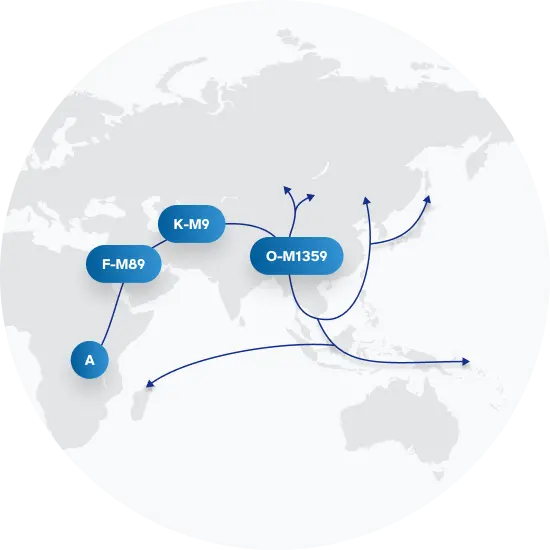Explore the Family Name Espiritu
How common is the last name Espiritu in the United States?
According to the data from the Decennial U.S. Census, the popularity of the surname Espiritu has seen a significant increase over the decade. In 2000, Espiritu was ranked 9,077th in terms of surnames, with a count of 3,310 individuals. By 2010, the rank had improved by approximately 17.35% to 7,502nd place, and the total count increased by 34.08% to 4,438. This equates to a proportional increase of 21.95 per 100,000 people when comparing the two census periods.
| 2000 | 2010 | Change | |
|---|---|---|---|
| Rank | #9,077 | #7,502 | 17.35% |
| Count | 3,310 | 4,438 | 34.08% |
| Proportion per 100k | 1.23 | 1.5 | 21.95% |
Race and Ethnicity of people with the last name Espiritu
The ethnicity of individuals bearing the surname Espiritu also experienced changes according to the Decennial U.S. Census data. The majority of the Espiritu surname is connected with Asian/Pacific Islander ethnic identity, with a slight decrease from 70.82% in 2000 to 69.04% in 2010. The percentage of those identified as having two or more races and White ethnic identity decreased by about 20%, whereas the Hispanic representation showed growth, increasing from 18.13% to 21.92%. Additionally, the Black and American Indian and Alaskan Native populations also experienced an increase, albeit these groups represent a smaller portion of the overall population with this surname.
| 2000 | 2010 | Change | |
|---|---|---|---|
| Asian/Pacific Islander | 70.82% | 69.04% | -2.51% |
| Hispanic | 18.13% | 21.92% | 20.9% |
| Two or More Races | 5.47% | 4.37% | -20.11% |
| White | 5.29% | 4.19% | -20.79% |
| Black | 0.15% | 0.29% | 93.33% |
| American Indian and Alaskan Native | 0.15% | 0.18% | 20% |
Espiritu ancestry composition
23andMe computes an ancestry breakdown for each customer. People may have ancestry from just one population or they may have ancestry from several populations. The most commonly-observed ancestry found in people with the surname Espiritu is Filipino & Austronesian, which comprises 70.5% of all ancestry found in people with the surname. The next two most common ancestries are British & Irish (6.1%) and Chinese (6.0%). Additional ancestries include Spanish & Portuguese, Indigenous American, French & German, Japanese, and Iranian, Caucasian & Mesopotamian.
Ready to learn more about your ancestry? Get the most comprehensive ancestry breakdown on the market by taking our DNA test. Shop 23andMe
| ANCESTRY BREAKDOWN | COMPOSITION |
|---|---|
| Filipino & Austronesian | 70.5% |
| British & Irish | 6.1% |
| Chinese | 6.0% |
| Other | 17.3% |

Possible origins of the surname Espiritu
Your DNA provides clues about where your recent ancestors may have lived. Having many distant relatives in the same location suggests that you may all share common ancestry there. Locations with many distant relatives can also be places where people have migrated recently, such as large cities. If a large number of individuals who share your surname have distant relatives in a specific area, it could indicate a connection between your surname and that location, stemming from either recent ancestral ties or migration.
Based on 23andMe data, people with last name Espiritu have recent ancestry locations in the Philippines and China.
| RECENT ANCESTRY Location | Percentage |
|---|---|
| Western Visayas, Philippines | 80.90% |
| Bicol, Philippines | 80.90% |
| Calabarzon, Philippines | 80.90% |
| Central Luzon, Philippines | 80.90% |
| Central Visayas, Philippines | 80.90% |
What Espiritu haplogroups can tell you
Haplogroups are genetic population groups that share a common ancestor on either your paternal or maternal line. These paternal and maternal haplogroups shed light on your genetic ancestry and help tell the story of your family.
The top paternal haplogroup of people with the surname Espiritu is O-F2415, which is predominantly found among people with East Asian & Indigenous American ancestry. Haplogroup O-F2415 is descended from haplogroup O-M1359. Other common haplogroups include E-M183 and O-F2859, which are predominantly found among people with European and East Asian & Indigenous American ancestry.
The most common maternal haplogroups of people with Espiritu surname are: M, B4b1a2, R. These most commonly trace back to individuals of East Asian & Indigenous American and European ancestry.
 Paternal Haplogroup Origins O-M1359
Paternal Haplogroup Origins O-M1359
Your paternal lineage may be linked to the Cham
One of the many populations harboring members of haplogroup O1b1a1a1a1 is the Cham ethnic group, a group of people who speak Austronesian languages in Mainland Southeast Asia. Austronesian languages make up a language family that is extremely large and widespread, comprising over 350 million people on islands such as Madagascar, Easter Island, and many others. However, Austronesian languages are less common on mainland Asia, with a notable exception being the Chamic language. Research suggests that ancestors of the Cham people migrated from Southeast Asian islands to the mainland around the year 500 BCE, and that early Cham populations quickly began mixing with indigenous southern Vietnamese populations. As a result, the Chamic language now has words that were borrowed from languages spoken by indigenous Vietnamese people. It is likely that an ancestral Kinh population was one of the populations that mixed with the Cham people shortly after their migration to mainland Asia.
Your maternal lineage may be linked to many people of Europe and Asia
Most of Europe's most common haplogroups, including H, J, T, V and U, are offshoots of R. Some, like U, were involved in some of the earliest migrations to Europe, while others spread from the Middle East with the dawn of agriculture. These groups spread east as well, reaching Central Asia and India first with early farmers and then with Iron Age migrants. In East Asia, R gave rise to the dominant haplogroups F and B. Members of just one branch of B, B2, migrated from Siberia to the Americas after the peak of the Ice Age 18,000 years ago, where their descendants are found today. However, no other branches of R have been found in the indigenous people of North and South America.

What do people with the surname Espiritu have in common?
Spoiler alert: it's complicated. People with the same last name are usually no more genetically similar than a randomly sampled group of people from the same population. That said, people with the same surname are more likely to have similar ancestries than randomly sampled individuals. The reason is the tendency of people with similar cultural or geographical backgrounds to preferentially mate with one another. That's why people who share a surname may be more likely to share traits and tendencies in common than people within the general population. Check out the percentages below to see the prevalences of tastes, habits, and traits of people with your surname compared with prevalences among 23andMe users.
Preferences
Traits
Habits
Are health conditions linked to the last name Espiritu?
The short answer is that, if there is an association between surname and health, it's usually more about your ancestry than your name. Individuals with a given surname are no more genetically similar than the general population but often have similar ancestries. The populations of people associated with those shared ancestries often have sets of genetic variations, also known as alleles, in common. Some of those alleles are associated with a greater likelihood of developing certain diseases.
Disease variant frequency by ancestry
Disease allele frequencies in populations associated with the surname Espiritu are shown below. Important Note: not everyone with a disease allele will develop these health condition







